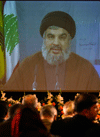BEIRUT — Hizbullah Secretary General Hassan Nasrallah said on Monday the major problem facing Lebanon’s political regime was political sectarianism, which hindered the establishment of a true democracy. He also stressed the continued need for the resistance, given the absence of a strong Lebanese state.

|
|
Lebanon’s Hizbullah leader Sayyed Hassan Nasrallah speaks via a giant screen during a news conference announcing party’s new political strategy in Beirut November 30, 2009. Lebanon’s Hizbollah Shi’a movement announced a new political strategy on Monday that tones down Islamic rhetoric but maintains a tough line against Israel and the United States. REUTERS/ Sharif Karim |
“The pivotal condition to the implementation of true democracy is to abolish political sectarianism in accordance with the Taif Accord, which calls for the formation of a national committee to accomplish the process,” Nasrallah said.
Nevertheless, Nasrallah added that until the Lebanese manage to abolish political sectarianism through national dialogue, consensual democracy should be adopted as a basis for governance in Lebanon.
“Since the political regime in Lebanon is based on religious foundations, consensual democracy remains the basis of governance in Lebanon because it reflects the spirit of the constitution and the essence of the national coexistence pact,” the sayyed said.
Nasrallah underlined that his call for the formation of a national committee tasked with abolishing political sectarianism does not mean the instant conclusion of the process but would rather necessitate years of dialogue.
“Meanwhile, consensual democracy is the best guarantee to preserve stability since it would boost trust among all Lebanese factions,” he said.
Tackling the Israeli threat, Nasrallah stressed the continued importance of the resistance, given the absence of a “strong capable Lebanese state” and the power imbalance between Lebanon and Israel.
The Hizbullah leader called for a defense strategy based on interaction between the resistance and the army to protect Lebanon from Israel.
“The constant Israeli threat necessitates a defense strategy based on cohabitation between a popular resistance that participates in the country’s defense against any Israeli aggression and a national army that protects the country and preserves its stability and security,” Nasrallah said.
The sayyed emphasized that the continuation of Israeli threats called on Hizbullah to pursue efforts to boost its capabilities to liberate the rest of the occupied Lebanese territories and prisoners.
On the domestic level, Nasrallah urged for the implementation of administrative decentralization in order to promote balanced developmental projects over all Lebanese territories.
However, Nasrallah warned against the evolution of decentralization into any form of federalism as he expressed the party’s opposition to any form of division, or masked federalism.
Tackling the issue of the Palestinian refugees in Lebanon, Nasrallah urged the government to grant them civil and social rights in order to improve their living conditions, while rejecting their naturalization and insisting on their right of return.
As for steps toward achieving such an end, Nasrallah urged for Lebanese-Palestinian dialogue as he called on the Palestinians to agree on a united representative of their different parties.
The sayyed also stressed the Palestinians’ right to resist Israeli occupation of their land through armed resistance, since previous experiences proved the failure of diplomatic negotiations.
On the regional level, Nasrallah called for inter-Arab and inter-Islamic cooperation as he stressed Iran’s and Syria’s role in supporting resistance movements in the region.
Nasrallah warned Arab states about American-Israeli plans to instigate schism in the region as he called on them to adopt a strategy of resistance. Accusing the U.S. of bringing full and blind support to Israel, Nasrallah stressed that major historical changes indicated a regression in the U.S. role as a dominant world power.
-Reprinted from The Daily Star






Leave a Reply